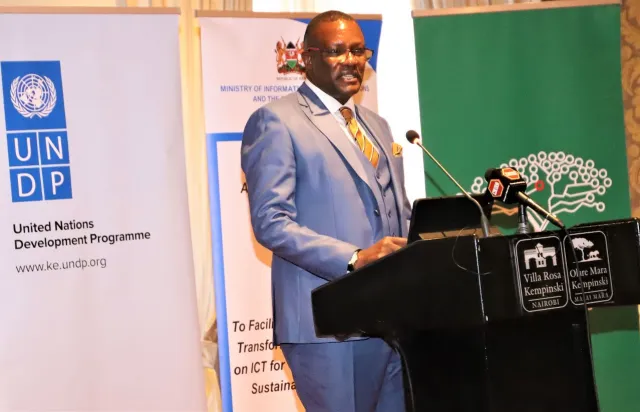The United Nations Development Programme (UNDP) has unveiled its Digital Public Infrastructure portfolio and signed a Memorandum of Understanding (MoU) with the Ministry of Information, Communications and the Digital Economy in support of the implementation of Kenya’s Digital Transformation Agenda.
ICT Cabinet Secretary Ministry of Information, Communications and the Digital Economy (MICDE), Eliud Owalo said that the collaborative initiative is well aligned with Ministry’s National Digital masterplan’s five pillars of digital infrastructure, digital services and data management, digital skills, digital entrepreneurship and effective alignment to policy, legal and regulatory frameworks.
“By equipping workers with the necessary digital skills, as envisaged in this partnership and breaking down data silos, automating government services, and fostering the growth of digital jobs and businesses, both parties aim to bedrock the future of Kenya on a solid sustainable and inclusive digital foundation,” said Owalo.
Speaking on Monday at a Nairobi Hotel during the signing of the MoU, the CS said “the government of Kenya recognizes that to achieve our digital agenda we will continually need partners on the deck. As witnessed in this forum, we have representatives from various MDAs, diplomatic missions, private sector organisations and non-governmental institutions.”

UNDP Kenya Resident Representative, Anthony Ngororano said that Kenya is leading the way in digital transformation on the African continent; however, the digital divide remains a challenge.
“Our partnership with the MICDE aims to address this and unlock Kenya’s full digital economy potential,” said Ngororano.
The partnership also aims to drive inclusive digital transformation and bridge the digital divide in Kenya and across Africa.
Collaboration among various stakeholders is paramount to fully unlock the potential of Africa’s digital public infrastructure.
Governments, private sector entities, and civil society organizations must work together to create an enabling environment that promotes investment, supports research and development, and nurtures local talent.
Collaboration at regional and continental levels can further enhance knowledge sharing, resource pooling, and the development of scalable solutions to address common challenges, ultimately paving the way for a prosperous and inclusive future.


